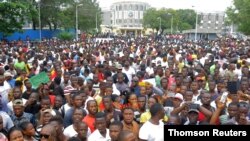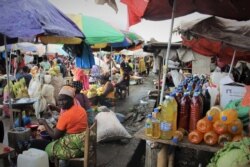“I'm finding life difficult for my children,” says Precillia Dehme, 33. The mother-of-three has a dry goods stall near Monrovia’s old airfield. She voted for Africa’s greatest footballer-turned Liberian president, George Weah, in 2017 but is beginning to regret her choice.
“All the prices have gone up in the market. We don’t know what’s going on in the country. My president is doing nothing for me, so I won't be voting for him again.”
An estimated 10,000 people attended an anti-government protest in Monrovia on June 7. It was sparked by anger about increasing economic hardship and a feeling that President Weah’s government is not doing enough to tackle rising inflation – currently the fourth highest in Africa.
“The current team is incapable of managing the economy,” says Henry Costa, a radio talk show host who played a leading role in organizing the protest. “We believe they should be fired and replaced by people who have a demonstrated track record of competence.”
Not everyone has turned against Weah, who warned that “our economy is broken [and] our government is broke” in an address to the nation shortly after he took office in January 2018.
Thirty-five-year-old money changer Munya Sherif doesn't blame the president for the country’s economic difficulties.
“All the problems in this country were caused by the past government,” he says. “We need to give this government a chance to do their work. Some people think that George Weah is not able to run this country, but I believe that if they give him a chance he can do better.”
The protest organizers are a group of opposition and civil society activists who call themselves the Council of Patriots. They have issued a long list of demands, including extensive reform programs.
Top of the list, according to Costa, is a demand for Weah to disclose his assets, which he has so far declined to do in spite of mounting suspicion surrounding private construction projects undertaken since he assumed office.
“We want to know what he had before becoming president, how he is able to build so many properties and acquire new ones in a relatively short period of time when he didn't do that before coming to power,” says Costa.
The Council of Patriots is threatening further protests if the government fails to act on their demands within a month.
President Weah has reacted by calling for a national roundtable to hear the views of the opposition, civil society and religious leaders on how best to revive the economy. Eugene Nagbe, the Minister for Information, says the dialogue will be the extent of the government’s response to the protesters.
“As Liberians they have a right to make their views clear,” Nagbe told VOA. “But as a government our response is a nationalistic one, a general one and this is why Mr. President recognized that there are alternative views and because of the alternative views he said come to the table so that we can have a discussion.”
Costa dismisses the call for dialogue as “a theatrical move.
“We don’t need a dialogue for the president to publish his assets. What are we going to dialogue about? We want action taken and we will not rest until we compel him to act.”
Dr Edwin Gbargaye, a lecturer in Economics and Public Administration at the University of the Liberia, considers the solution to be clear-cut: “Good governance is the best way out. Minimize corruption and make sure that food and basic necessities are in the homes of Liberians.”
Talks have started with the International Monetary Fund about a program intended to promote better governance and transparency. But until the effects of this trickle down to ordinary citizens and basic goods become more affordable, the protests against President Weah are likely to continue.
“We are not denying that there is a serious economic crisis,” says government spokesman Nagbe, “but we are putting in place the right measures to fix it. We are approaching the IMF discussions with an open mind. We recognize that there have to be reforms not just in the fiscal and monetary areas but also generally in how we carry out governance.”







